The Youngest and Oldest Olympic Gold Medalists in Women’s Wrestling
Tuesday, May 12, 2020 - 20:28 By Ikuo Higuchi

(This is the second of a three-part series that appeared on the Japan Wrestling Federation website. It was translated for UWW by Ken Marantz.)
A Tale of Two Wangs, and a Japanese Legend
Since women's wrestling was added to the Olympic program at the 2004 Athens Games, there have been 18 gold medals awarded. There has been only one teenaged champion, and she emerged at that inaugural Olympics for women. WANG Xu (CHN) was 18 years 10 months 27 days when she captured the 72kg gold.
At those same Olympics, Kaori ICHO (JPN) won the first of her unprecedented four golds with a victory at 63kg at 20 years 2 months 10 days, which is still second on the all-time list. Another Wang--WANG Jiao (CHN)--kept the 72kg title in Chinese hands when she took the gold four years later at the Beijing Olympics. Through four Olympics, the two Wangs and Icho are the only champions under the age of 21.
The Wangs shared something else in common--neither one won a World Championship title either before or after their Olympic triumph. Xu finished second in 2002 and third in the year before the Athens Games, while Jiao came up empty-handed in three trips to the World Championships prior to winning in Beijing. That triumph before a home crowd transformed her into a national star. As much as her exploits on the mat, she endeared herself to fans at the post-match press conference, where she surprisingly felt the need to first introduce herself.
The first 30-something champion came at the 2012 London Olympics, where Hitomi OBARA (JPN) capped a career that included eight world championships by taking the Olympic gold at 48kg at 31 years 7 months 4 days. That record, however, lasted only until the next Olympics, where Icho captured her fourth and final gold with a victory at 58kg at 32 years 2 months 4 days. That naturally makes Icho the Japan record-holder for both youngest and oldest.
It may be a longshot, but Icho's record as oldest could fall to world silver medalist Hiroe MINAGAWA (JPN), who will be close to 34 at next year's Tokyo Olympics. In fact, she could have broken the mark even if the Tokyo Games had gone on as scheduled this summer.
Another wrestler, however, has emerged as a possible record-beater. Coming off her triumph at 50kg at last year's World Championships, Mariya STADNIK (AZE) will certainly be among the favorites for the gold in Tokyo, where she will be 33. As mentioned previously in the men's freestyle, there is an extra burden for the lighter wrestlers now that there are weigh-ins in the morning of the competition on multiple days. How Stadnik, a two-time Olympic silver medalist, can handle that could determine her fortunes in her fourth career Olympics.
WOMEN'S OLYMPIC CHAMPIONS, FROM YOUNGEST TO OLDEST
Name Age Olympics Wt. Date of birth
1. Xu WANG (CHN) 18 years 10 months 27 days 2004 Athens 72kg 1985/09/27
2. Kaori ICHO (JPN) 20 years 2 months 10 days 2004 Athens 63kg 1984/06/13
3. Jiao WANG (CHN) 20 years 7 months 13 days 2008 Beijing 72kg 1988/01/04
4. Natalya VOROBIEVA (RUS) 21 years 2 months 13 days 2012 London 72kg 1991/05/27
5. Risako KAWAI (JPN) 21 years 8 months 28 days 2016 Rio de Janeiro 63kg 1994/11/21
6. Sara DOSHO (JPN) 21 years 10 months 0 days 2016 Rio de Janeiro 69kg 1994/10/17
7. Saori YOSHIDA (JPN) 21 years 10 months 18 days 2004 Athens 55kg 1982/10/05
8. Irina MELNIK-MERLENI (UKR) 22 years 6 months 15 days 2004 Athens 48kg 1982/02/08
9. Eri TOSAKA (JPN) 22 years 11 months 18 days 2016 Rio de Janeiro 48kg 1993/08/30
10. Kaori ICHO (JPN) 24 years 2 months 4 days 2008 Beijing 63kg 1984/06/13
11. Helen MAROULIS (USA) 24 years 10 months 30 days 2016 Rio de Janeiro 53kg 1991/09/19
12. Erica WIEBE (CAN) 25 years 2 months 5 days 2016 Rio de Janeiro 75kg 1989/06/13
13. Saori YOSHIDA (JPN) 25 years 10 months 11 days 2008 Beijing 55kg 1982/10/05
14. Carol HUYNH (CAN) 27 years 9 months 0 days 2008 Beijing 48 kg 1980/11/16
15. Kaori ICHO (JPN) 28 years 1 month 26 days 2012 London 63kg 1984/06/13
16. Saori YOSHIDA (JPN) 29 years 10 months 4 days 2012 London 55kg 1982/10/05
17. Hitomi OBARA (JPN) 31 years 7 months 4 days 2012 London 48kg 1981/01/04
18. Kaori ICHO (JPN) 32 years 2 months 4 days 2016 Rio de Janeiro 58kg 1984/06/13

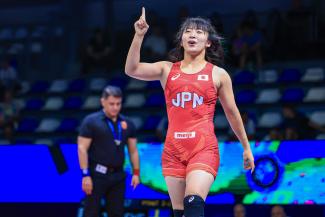
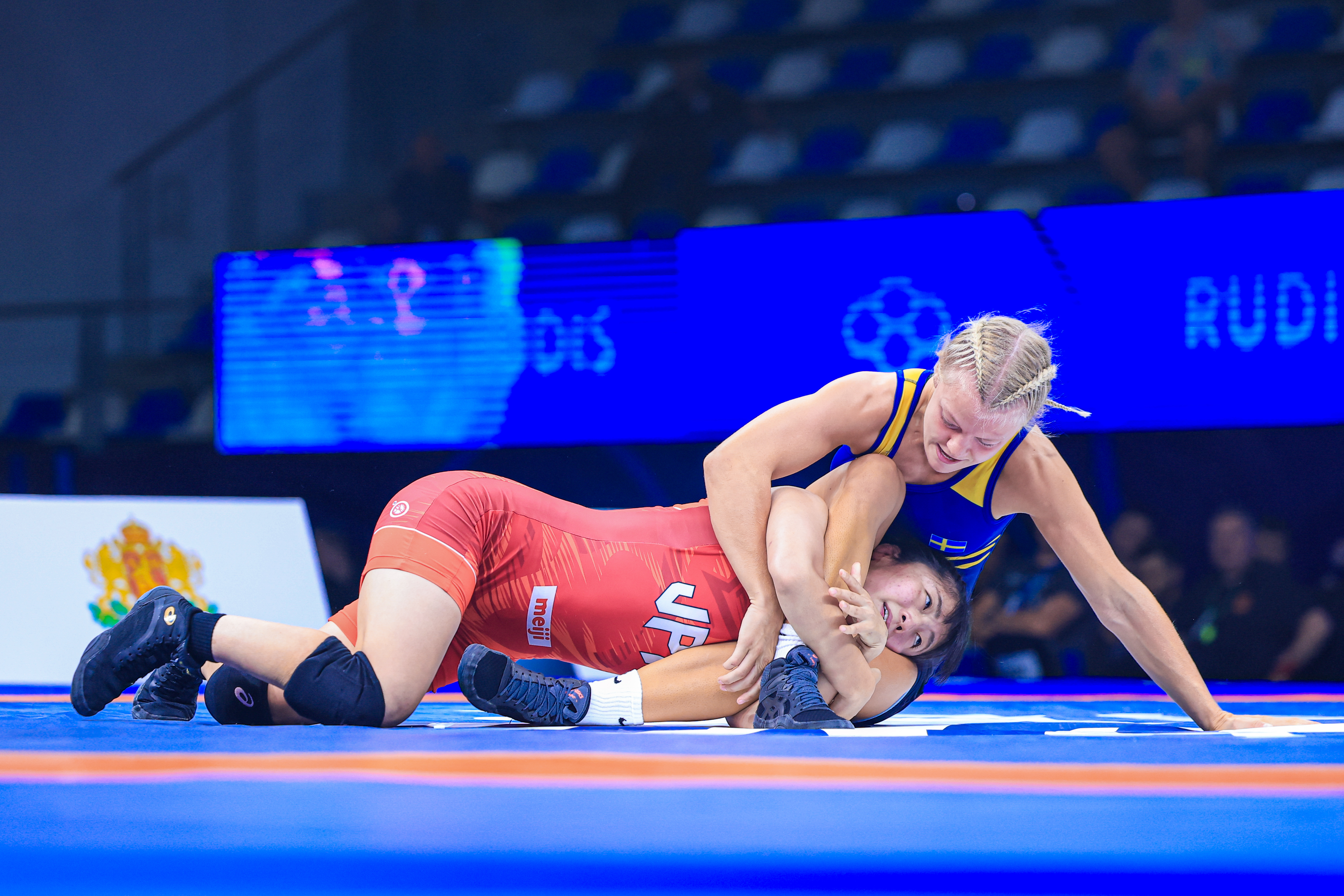 Sakura ONISHI (JPN) uses her trademark lace against Karin SAMUELSSON (SWE) in the 59kg final. (Photo: United World Wrestling / Amirreza Aliasgari)
Sakura ONISHI (JPN) uses her trademark lace against Karin SAMUELSSON (SWE) in the 59kg final. (Photo: United World Wrestling / Amirreza Aliasgari)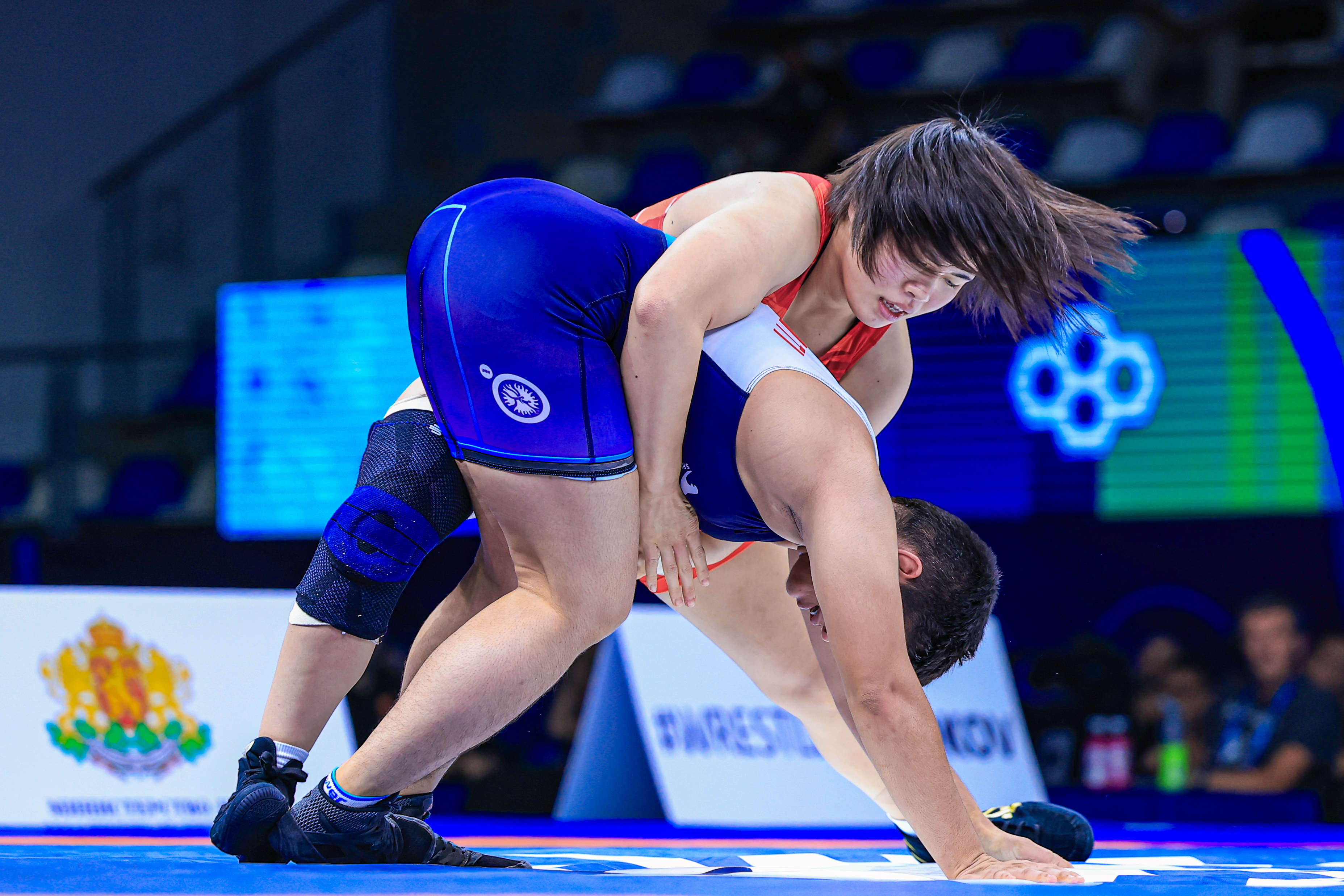 Ray HOSHINO (JPN) works on a takedown against SRISHTI (IND) in the 68kg final. (Photo: United World Wrestling / Amirreza Aliasgari)
Ray HOSHINO (JPN) works on a takedown against SRISHTI (IND) in the 68kg final. (Photo: United World Wrestling / Amirreza Aliasgari)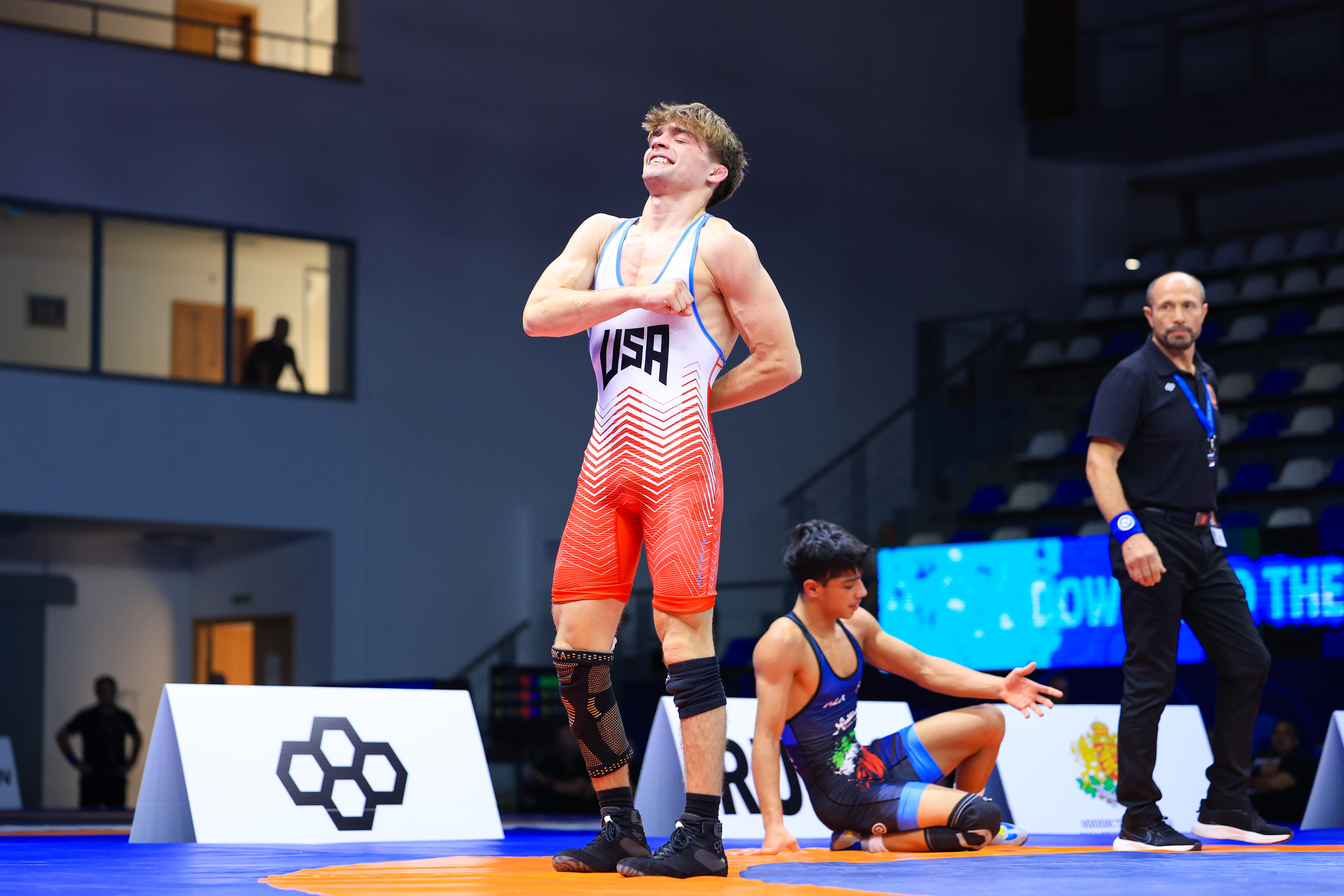 Marcus BLAZE (USA) celebrates, like his roommate at Penn State Masanosuke ONO (JPN), after winning the 61kg final. (Photo: United World Wrestling / Kadir Caliskan)
Marcus BLAZE (USA) celebrates, like his roommate at Penn State Masanosuke ONO (JPN), after winning the 61kg final. (Photo: United World Wrestling / Kadir Caliskan)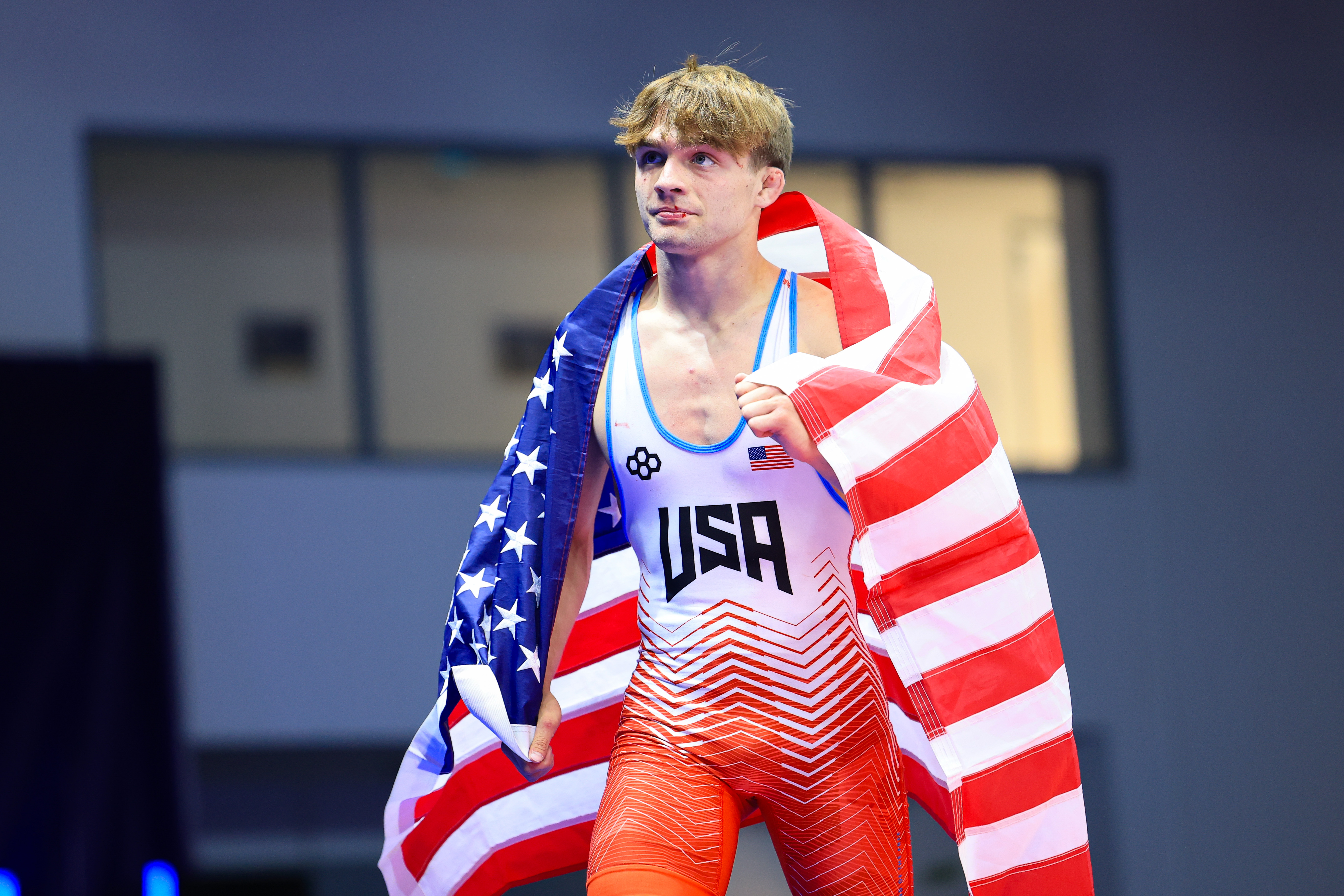 Marcus BLAZE (USA) is now a world U17 and U20 champion. (Photo: United World Wrestling / Kadir Caliskan)
Marcus BLAZE (USA) is now a world U17 and U20 champion. (Photo: United World Wrestling / Kadir Caliskan)
Share your thoughts.
Comments